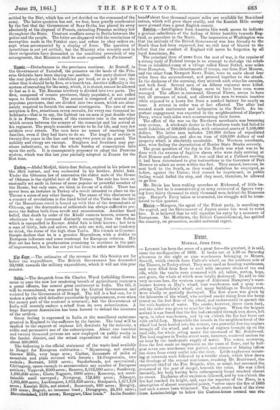Sallift, l —The despatch from Sir Charles Wood forbidding Govern- ment to
pass the new law rendering breach of agricultural contracts a penal offence, has caused great excitement in India. The bill, it will be remembered, was proposed by the Central Government and resisted by the Government of Bengal. The bill is a bad one, for it makes a purely civil defaulter punishable by imprisonment, even when the money part of the contract is returned ; but the Government of India will scarcely endure a rebuff from its own subordinates. A large European Association has been formed to defend the interests of the settlers.
Great feeling is expressed in India at the munificent assistance granted in England to the sufferers by the famine. The fund will be applied to the support of orphans left destitute by the calamity, a noble and permanent use of the subscriptions. About one hundred and twenty thousand persons are now employed on public works in the famine district, and the actual expenditure for relief will be about 250,0001. The following is the official statement of the waste land available in Bengal for European cultivation : " Mymensing, not stated ; Garrow Hills, very large area ; Cachar, thousands of miles of mountain and plain covered with forests ; 24-Perguunahs, two mehals ; Barraset, 5289 acres ; Sunderbunds, not ascertained ; Chittagong, space enough to accommodate any number of European settlers ; Tipperale 2500 acres; Ramre,e, 3,152,000 acres ; Sandoway, 1,200,000 acres; Chota Nagpore, 8000 acres; Kamroop, not ascer- tainable until surveyed; Nowgong, 17$,560 acres ; Sibsagur, 1,205,609 acres; Luchimpore, 1,612,636 acres; Goalparali, 1,471,728 acres ; Kassiali Hills, not stated; Bancoorali, 680 acres ; Hooghly, 139 acres ; Bograli, an immense tract ; Divagepore, 25,861 acres ; Moorshedabad, 1189 acres; Rungpore, Clan lands." In the Sunder• build? aliout four thousand square miles are available for Sea-island cotton, which will grow there readily, and the Kassiah Hills occupy more ground than a great English county. 411artim—Intelligence from America this week seems to indicate a gradual subsidence of the feeling of bitter hostility towards Eng- land, so prevalent in the North. The impression at Washington was that the attitude of the British Government was less friendly to the South than had been supposed, but we still bear of bluster to the -effect that the conduct of England will never be forgotten by all loyal Americans, &c. The principal item of news from the seat of war, is the repulse of a strong body of Federal troops in an attempt to dislodge the rebels from an inhabited camp at a village called Great Bethel, nine miles from Hampton. Two detachments of troops, one from Fort Monroe, and the other from Newport News Point, were to unite about four miles from the entrenchment, and proceed together to the attack. In the darkness of the morning, they mistook each other for enemies, and both fired. Several men of an Albany regiment were killed. Arrived at Great Bethel, things seem to have been even worse managed. The officer in command, General Pierce, seems to have lost all presence of mind, and allowed his men to remain inactive while exposed to a heavy fire from a masked battery for nearly an hour. A retreat in order was at last effected. The affair had created much excitement and indignation in the North. An im- portant engagement was expected in the neighbourhood of Harper's Ferry, where both sides were concentrating their forces. The effect of the war on the Northern merchants was becoming very serious. A wholesale dealer in the Southern trade had failed to meet liabilities of 500,000 dollars, with estimated assets of 1,500,000 dollars. The latter sum includes 750,000 dollars of repudiated Southern obligations, and also an item of 650,000 dollars of real property which is absolutely unsaleable. The Western merchants, also, were feeling the depreciation of Border State Stocks severely. The great question of the day in the North was what was to be done with the swarms of fugitive slaves who were daily arriving at Fort Monroe and elsewhere. It was said that at a Cabinet meeting it had been determined to give instructions to the Governor of Fort Monroe to admit no more within the fort. They cannot, however, be sent back to the South, as they would doubtless be employed, as before, against the Union; they cannot be imprisoned, as public feeling would forbid the step, and they must, therefore, be allowed to go free.
Mr. Davis has been making speeches at Richmond, of little im- portance, but he is concentrating an army estimated at figures vary- ing from thirty thousand to sixty thousand men, behind the Manassas gap. Harper's Ferry taken or evacuated, the struggle will be trans- ferred to this quarter.
302411.—Marquez, the agent of the Priest party, is marching on the capital, and the Government. of Juarez seems too weak to resist him. It is believed that he will signalize his entry by a massacre of Europeans. Mr. Matthews, the British Consul-General, has quitted the country, on promotion, amidst universal regret.






























 Previous page
Previous page